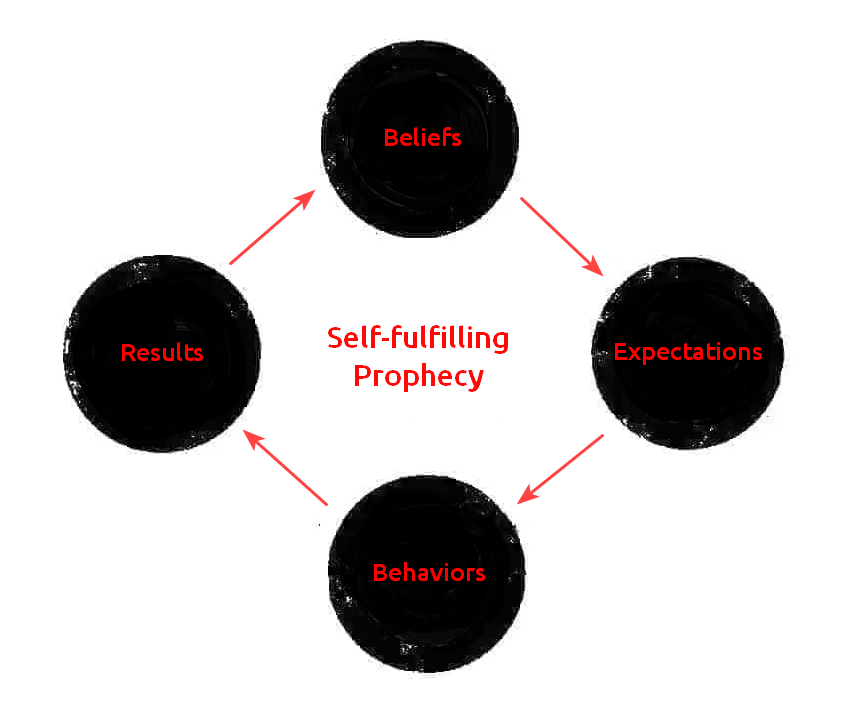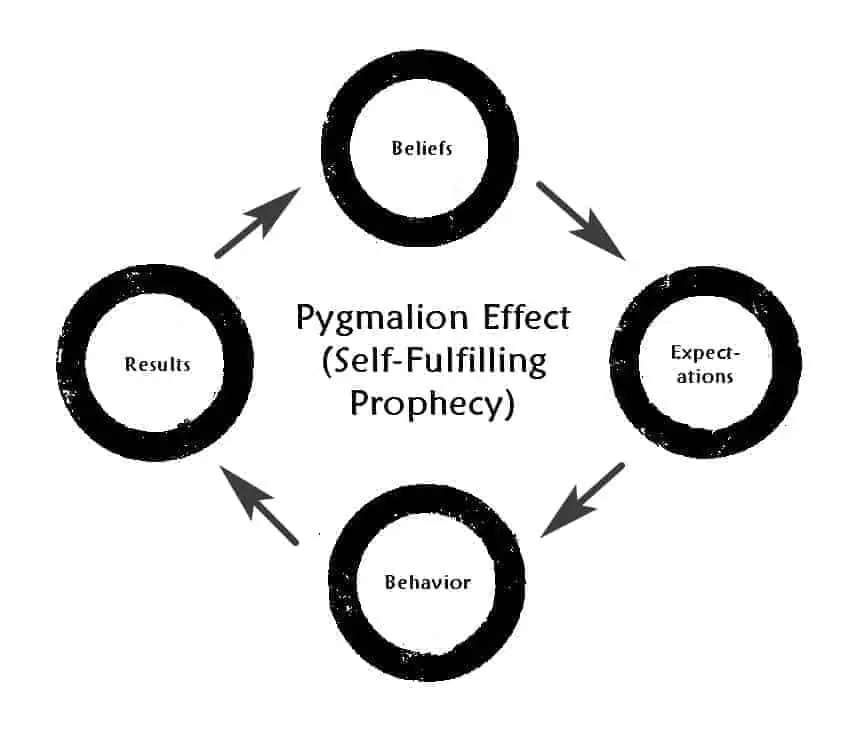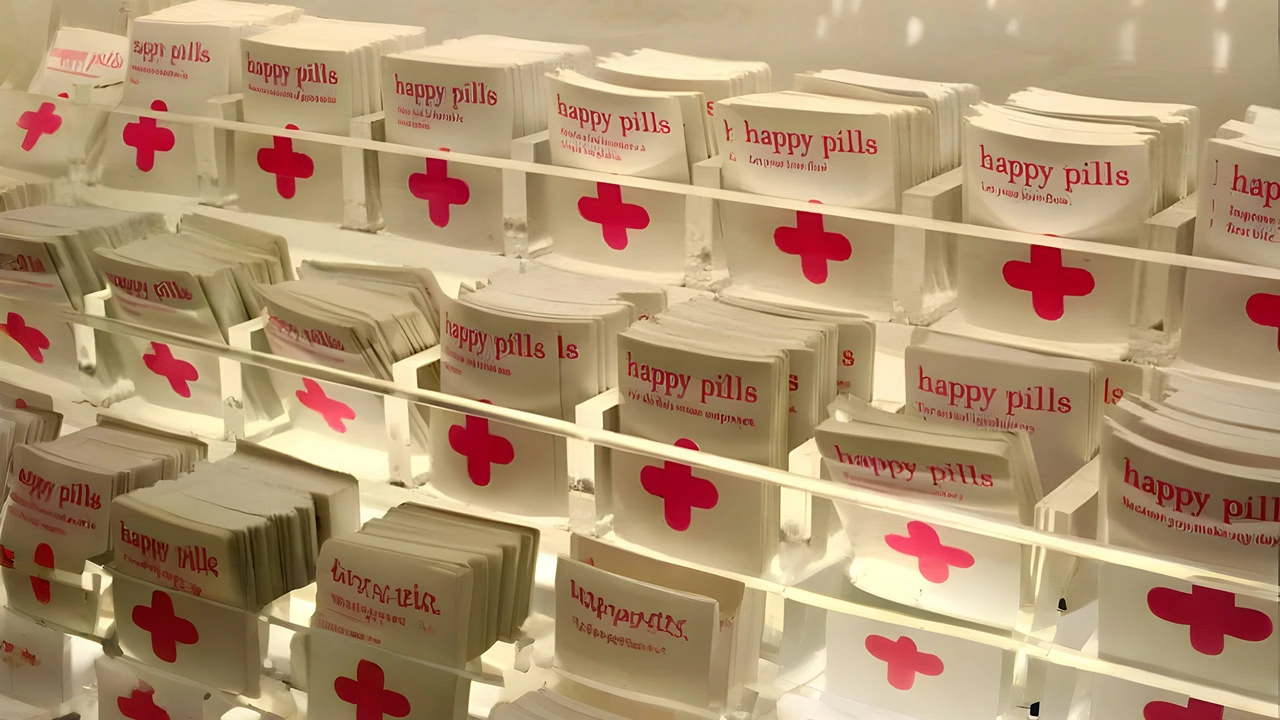• Mar 4, 2025 • Read in ~12 mins
— By Dr. Sandip Roy.Self-fulfilling prophecy is a science-tested way to make wishes come true. Not always, but it does increase the chance of a wish becoming a reality.
This is an example of what a self-fulfilling prophecy can be:
- Your friend predicts something will happen next week.
- And indeed, it happens next week.
- They believe their prediction made it happen.
Perhaps, they said, “France will lose the final game” and France lost.
So, a self-fulfilling prophecy occurs when a prediction comes true without the predictor doing anything to make it happen.
Is self-fulfilling prophecy the real secret behind the law of attraction?
Self-fulfilling prophecy in psychology
Have you heard of “manifestation experts” who teach you how to turn your dreams into reality through self-fulfilling prophecies?
But, is it really possible for a prediction to come true just because someone said it would?
Let’s dive into what psychology has to say about this intriguing concept.

1. Self-fulfilling prophecy meaning
A self-fulfilling prophecy (SFP) occurs when the outcome of an event is the same as predicted. The prediction had no factual or logical basis, yet the person was certain that it would come true. As a result, it appears that the expectation triggered the incident.
According to social psychologist Lee Jussim, a self-fulfilling prophecy occurs when an originally false social belief leads people to act in ways that objectively confirm that belief.
Self-fulfilling prophecies can occur in school, work, and even in everyday life. Social science researchers suggest that SFP occurs in both experiments and real-life situations.
You may see a self-fulfilling prophecy as a cycle. First, you form a belief about a thing and expect it to happen. Then the thing actually happens. Then, the result strengthens your conviction that your belief made it happen.

2. Self-fulfilling Prophecy and Schema
We know that our thoughts can change the way we act. This is called “schema.”
Schemas are like maps in our minds that help us understand things better. They help us make sense of new information by connecting it to what we already know.
Schemas can be expectations, beliefs, or experiences that influence our behaviors and decisions.
Sometimes, schemas can change an outcome, resulting in a self-fulfilling prophecy.
3. What are the two types of self-fulfilling prophecy?
A self-fulfilling prophecy can be of two types:
- Self-imposed: a prophecy coming true based on the person’s own prediction.
- Other-imposed: a prophecy causing itself to exist based on another’s prediction about the person’s future outcome.
4. How do self-fulfilling prophecies work?
Self-fulfilling prophecies work through a belief stage to reach a fulfillment stage. The 4 stages of self-fulfilling prophecy are:
- Beliefs: First, the person forms a certain belief.
- Expectations: Second, they set expectations for that belief.
- Behavior: Third, they begin a series of behavior changes to match those expectations.
- Results: Fourth, the outcomes are consistent with the expectations and behavior changes.
Finally, after the four stages are completed, another cycle of self-fulfilling prophecy begins.

Dig deep, and you’ll find two interesting facts:
- The predicting person’s initial beliefs come from their past experiences.
- Self-fulfilling incidents convince them that their thoughts can cause events to occur.
Self-fulfilling prophecy examples in psychology
1. First SFP study in psychology
In 1963, psychologist Robert Rosenthal and Oak/Spruce School principal Lenore Jacobson carried out a novel experiment.
At the start of the school year, they handed the students an IQ test called the Tests of General Ability (TOGA).
This test was mostly not related to the reading and writing skills taught in school.
First, the teachers were told the test was the “Harvard Test of Inflected Acquisition,” and that it would measure the students’ academic “blooming” capacity.
Following the test, 18 teachers were informed that their students had scored in the top 20% of the test. These students had “unusual potential for intellectual growth” as per their scores, and were ready to bloom and realize their potential.
Eight months later, all students took the same TOGA test. What transpired was surprising: kids who were marked as “ready to bloom” performed much better than those who were not on the merit list.
However, there were 2 big lies in the experiment.
- One, the TOGA test was useless in predicting academic success.
- Two, the “top” students were chosen at random, regardless of their test scores.
The teachers were not told of the test’s “fakeness” or that the chosen students were no different from others. More amusingly, teachers were instructed not to treat these future superstars any differently than other pupils.
Nonetheless, the students who excelled and outperformed the rest were those whom their teachers predicted would become academic stars.
The teachers had expected excellence from the marked “exceptional” students, and this belief of theirs led the students to deliver top results.
The results, as concluded by Rosenthal and Jacobson, showed an observer-expectancy effect. In plain words, it was a powerful show of self-fulfilling prophecy.
The findings struck gold and became hugely famous. It soon became known as the Rosenthal effect and Pygmalion effect. They later wrote a book about it, Pygmalion In The Classroom.
2. Self-fulfilling prophecy examples in relationships
In romantic relationships, positive expectations result in positive effects, and negative expectations beget negative outcomes.
This is because our expectations from the people we love have a strong influence on our subconscious behavior. This often leads to self-fulfilling prophecies.
Here are the findings of three different research papers (and hence excellent scientific examples) on self-fulfilling prophecy in close relationships involving romance:
- Murray and colleagues discovered that the more positive the illusion one has of their partner, the longer that relationship is likely to last. This also makes the romantic partner more likely to view them more positively.
- Downey and his colleagues discovered that people who are afraid their romantic partners will reject them are more likely to be rejected by those partners.
- Beauty can sometimes be self-fulfilling. In one study, men were shown beautified images of a woman, which led them to believe she was physically attractive. They were then asked to interview the woman. Not only did the men become warmer and kinder to her, but she also became warmer and friendlier in response. Remember, the woman was not as beautiful as her fake images suggested. The men began with the false notion that she was attractive, but in the end, they behaved as if she were more beautiful than she actually was.
Read the paper The Self-Fulfilling Prophecy in Close Relationships by Geraldine Downey, Antonio L. Freitas, Benjamin Michaelis, and Hala Khouri.
What is the importance of self-fulfilling prophecy in psychology?
Why is self-fulfilling prophecy important? Psychologists believe that it is related to confirmation bias, the placebo effect, and the hope theory.
1. Self-fulfilling Prophecy and Placebo Effect
In scientific terms, a self-fulfilling prophecy (SFP) is a close kin of the placebo effect.
What is a placebo? The American Cancer Society explains it as:
A placebo (pluh-SEE-bow) is a substance or other kind of treatment that looks just like a regular treatment or medicine, but is not.
Placebo use is a standard method used in medical science. Here’s how it happens:
A person is given a pill called a placebo while telling them it will have a certain effect on them. Now the effect could be positive or negative; it doesn’t matter.
What happens next is this: the effect comes to manifest.
However, the strangest thing here is the pill had nothing that could have produced the effect. The pill was fantastically empty.
So, a placebo is an inactive “look-alike” substance that is not a medicine.
For example, in an experiment, a researcher gives you a pill and tells you it will cause you a mild headache in a few hours. They ask you to go into a room, sit down, and report back when a headache appears.
Surprisingly, you develop a throbbing headache within an hour. So you go back and tell them you got a headache within 45 minutes, and blame the strength of the pill for it.
Now, the researcher gives you another pill and tells you it will cure your headache. And, no surprise this time, the pill eases you out of your headache. So, you go back and tell them it was a great pill and your pain vanished within 20 minutes.
The researcher carefully notes down the data while thanking you.
Now, if you haven’t already guessed, the reality was this: Both the pills were exactly the same.
And surprisingly, neither of them contained any drug. Not even the smallest bit. Both were just sugar pills.
But each had the effect it was told will have. And that’s your placebo.
Why do the researchers play such tricks?
Well, this is why: While you were in a room after having the empty pill, others in another room were given the real pill, but weren’t told how it would affect them.
Finally, the researchers compared the data from both rooms and reached a decision about how much effect the drug really had.
In a way, a self-fulfilling prophecy is something similar; it’s the placebo of the masses.

2. Self-fulfilling Prophecy and Hope Theory
Self-fulfilling prophecy has a built-in heart of hope.
And hope is a desire with an expectation for something, especially something good. It’s a wish laden with belief in the possibility something good is going to happen.
In psychology, however, hope isn’t just wishful thinking. What Barbara Fredrickson, a pioneering positive psychologist and author of Positivity, says about hope is this:
Hope is not the typical form of positivity that we know of; rather, it comes into play when our circumstances are dire… when fear, hopelessness or despair seem just as likely.
Shane Lopez, the world’s foremost researcher on hope and author of Making Hope Happen, lays down the basic principles of hope. He says when you hope, you start with these 4 beliefs:
- The future will be better than the present
- You have the power to make it so
- There are many paths to your goals
- None of them is free of obstacles
The “Big Daddy” of hope, the late Charles “Rick” Snyder, the M. Erik Wright Distinguished Professor of Clinical Psychology at the University of Kansas, and author of Handbook of Hope, developed the Hope Theory. Accordingly, hope has 3 components:
- Goals — finding realistic and meaningful goals
- Pathways — finding ways to fulfill your goals
- Agency — finding the determination to change yourself, overcome the obstacles in the path, and achieve your goals
You must have heard and read the popular saying:
Where there’s a will, there’s a way.
What Prof Snyder did was redefine it in a scientific way. What he meant was, from a point of psychology, to hope successfully, you need to have both the agency and the pathway to go after your desired goals.
Snyder’s experiments (The Effectiveness of a Hope Intervention in Coping with Cold Pressor Pain) showed people with high hopes tolerate pain almost twice as long as those with low levels of hope.
By the way, did you know there are differences between Hope and Optimism?
3. Self-fulfilling Prophecy and Confirmation Bias
Does a self-fulfilling prophecy originate from a cognitive error: confirmation bias?
Confirmation bias is a type of selective thinking. It makes you notice and seek out things that confirm your pre-set beliefs. While ignoring or minimizing the importance of what is against your beliefs.
This bias is our human tendency to gather pieces of evidence that favor our existing belief while rejecting those that challenge it.
- Suppose someone starts their morning expecting that they will have a bad day.
- Then, instead of noticing what goes well during the day, they focus on what goes wrong.
- At the end of the day, these few bad experiences confirm that their entire day was indeed bad.
Coulacoglou and Saklofske in their book Psychometrics and Psychological Assessment write that confirmatory bias is similar to a self-fulfilling prophecy.
They say we all seek evidence that validates our previously held beliefs and values and undermine those that contradict our expectations.
This one-sided judgment of an event based on proof to support a preconceived idea is what resembles the self-fulfilling prophecy.
The self-fulfilling prophecy is similar to confirmation bias.
Self-fulfilling prophecy theory And Robert Merton
Back in 1948, Robert K. Merton, a criminologist who wrote extensively on serendipity, introduced the term “self-fulfilling prophecy.”
Merton proposed that our beliefs and ideas shape our thoughts, which then makes us act in ways that turn those expectations into a reality.
Merton’s definition of a self-fulfilling prophecy was:
A false definition of the situation evoking a new behavior which makes the originally false conception come true.
— Robert K. Merton
He also explained it in a simpler way:
If men define a situation as real, it becomes real in its consequence.
Merton, widely regarded as a founding father of modern sociology, was the first sociologist to receive a National Medal of Science. He wrote the following books:
- Social Theory and Social Structure
- On the Shoulders of Giants: A Shandean Postscript
- The Sociology of Science: Theoretical and Empirical Investigations
Interestingly, he was an amateur magician in his teenage years.
He also coined another popular phrase that we use today: “role model.”
Final words
[Download PDF: The Psychology of Self-fulfilling Prophecy]
Self-Fulfilling Prophecy is a useful and helpful concept in psychology. When we expect positive things to happen, it can boost our chances of having positive results.
Keep in mind, though, that it is never the be-all and end-all of our lives. If you truly want to use self-fulfilling prophecy to manifest your dreams, do it in a realistic manner.
√ Also Read: 12 Behaviors That Strongly Suggest You Lack Self-Discipline
√ Please share it with someone if you found this helpful.
